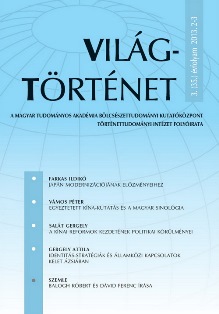Identitás-stratégiák és államközi kapcsolatok Kelet-Ázsiában. A Kína–Japán–Korea komplexumról
Identities and Interstate Relations in East Asia – The China-Japan-Korea Complex
Author(s): Attila GergelySubject(s): History
Published by: Magyar Tudományos Akadémia Bölcsészettudományi Kutatóközpont Történettudományi Intézet
Summary/Abstract: Interstate relations between China, Japan and Korea are among the oldest in Asian history. While momentous in themselves, they are taking a new significance in our days on a global scale. To complement “realist” and “liberal” approaches, the present paper explores how bilateral and trilateral Japanese, Chinese and Korean interactions in their wider contexts are shaped by cultural traditions and contemporary policies of state identities. For the given purpose, the latter are operationalized in terms of the typical “identity dilemmas” foreign policy actors are facing in the People’s Republic of China, in Japan, and in the Republic of Korea, continually constructing and reconstructing themselves. Framed by the concept of an “identity complex”, both contrastive and shared features of the respective identity fields are analyzed, with special regard to their conflict potential due to simultaneously common and incompatible identity claims. In order to locate the reviewed identity interactions in a more inclusive perspective and to indicate generalized implications, a broader typology of culturally conditioned identity regimes for further research is outlined.
Journal: Világtörténet
- Issue Year: 2013
- Issue No: 2-3
- Page Range: 289-331
- Page Count: 43
- Language: Hungarian

